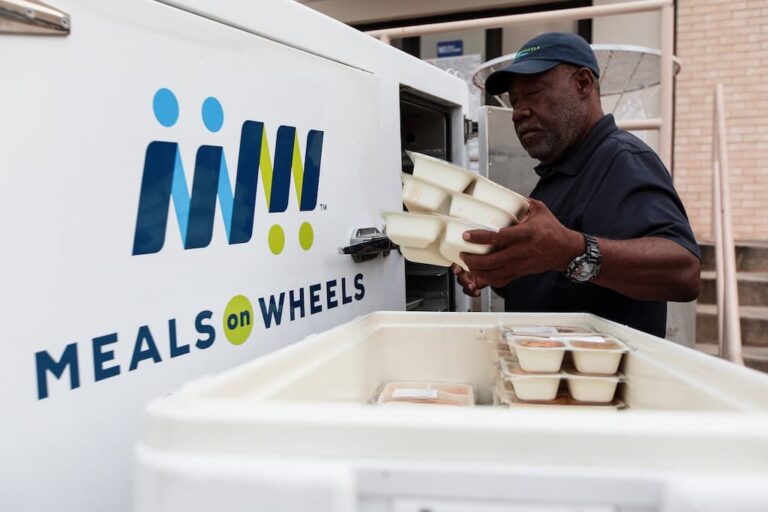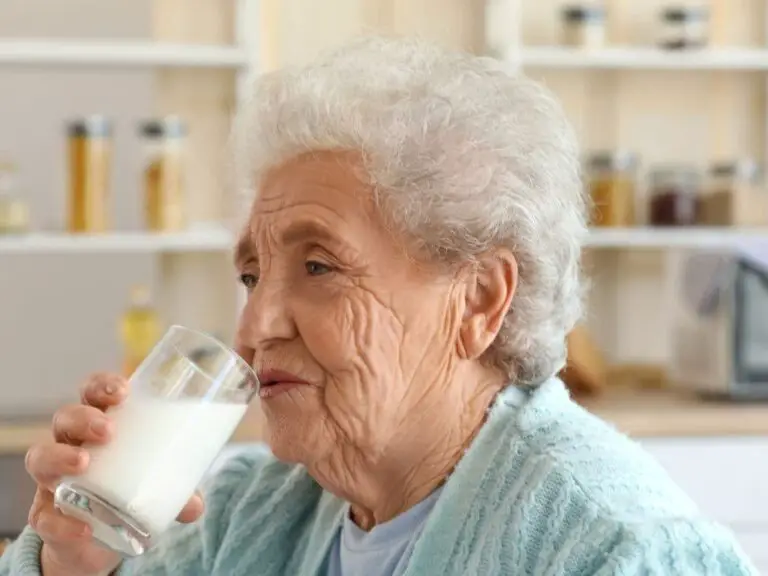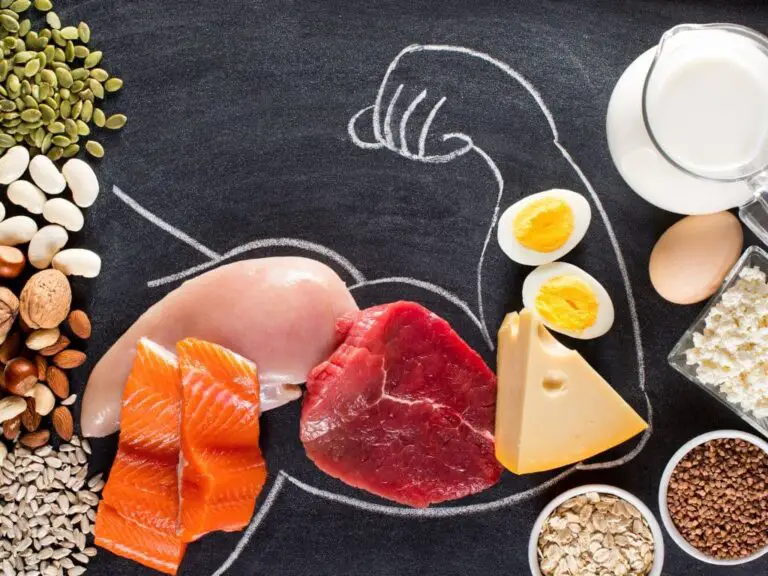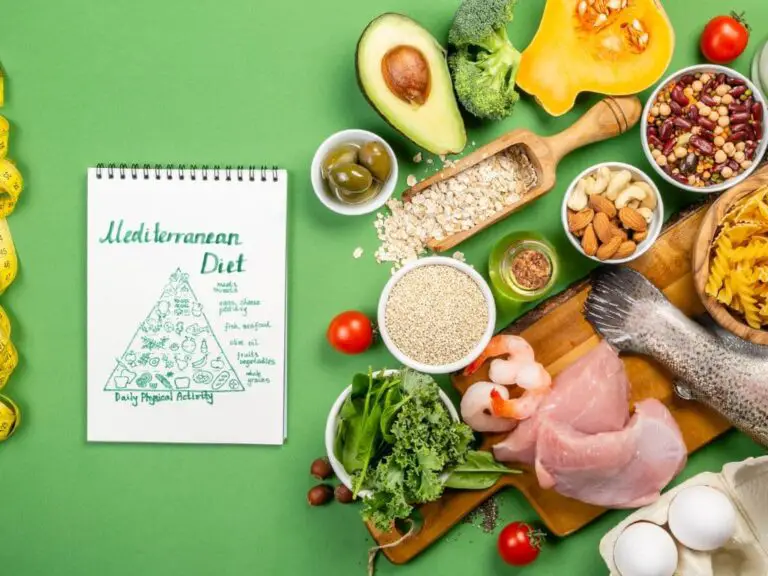How Much Milk Should A 70-Year-Old Drink?
Milk and dairy products are essential nutrients, but they can also be high in saturated fat and cholesterol, which can increase a person’s risk for heart disease, stroke, and other health problems.
So, how much milk should a 70-year-old drink? Most people over the age of 70 should drink 3 to 4 cups of milk per day, as milk is a good source of protein, calcium, and vitamin D. It’s important to drink milk that is low in fat and has no added sugar for the best health benefits.
Milk and dairy products are also high in calcium, which is good for the bones. Their daily calcium intake should be 1200 mg per day.
Most doctors recommend that seniors should drink low-fat milk.

If you want to know why it is important for a 70-year-old to drink milk in the right amount, continue reading.
The Benefits of Drinking Milk For Seniors
If you’re getting close to retirement age, there are many benefits to drinking milk on a regular basis. For example, it can help you maintain strong bones. It is also a source of potassium and is great for your skin. Listed below are just a few of the many benefits of milk in old age.
Strong Bones
Drinking milk daily can help you build strong bones. Milk contains calcium and vitamin D, two of the most important nutrients for strong bones. These nutrients help regulate calcium and phosphate levels in the body. Without them, bones don’t properly form and mineralize. Moreover, calcium deficiency can weaken existing bones, leaving people at risk for osteoporosis. Besides calcium, milk also contains vitamin D, which helps the absorption of calcium. As we age, our bones weaken, and cartilage wears away. As a result, many people develop arthritis.
Provides Potassium
Milk is an excellent source of potassium and calcium. Drinking three cups of milk daily provides about 380 milligrams of potassium. You can also find potassium in foods like bananas and avocados. Potassium is important for heart health, and a 100-g serving of milk contains 162 milligrams of potassium. Milk has many health benefits, and it should be part of an older adult’s diet. Many elderly people do not get enough potassium, and this can lead to high blood pressure. By adding milk to the diet of older people, they can avoid these health problems.
Healthier Skin
Drinking milk can provide your skin with a variety of nutrients, including vitamin A, zinc, iodine, and protein. In addition, milk contains antioxidants that fight oxidative damage in your body. These compounds help your skin retain a youthful glow. It may also delay fine lines and wrinkles on the skin. Vitamin A can also help maintain the health of the skin and eyes. It promotes the development of new skin cells and maintains the health of the retinas.
Muscle Growth
Drinking milk in old age may benefit your body, especially for muscle growth. Milk contains high concentrations of essential amino acids, such as leucine, which stimulate muscle protein synthesis. Research has shown that milk, as well as whey, may help you build lean muscle mass. In one study, those who drank milk increased their muscle mass by almost eight pounds. Another study found that drinking milk during old age can improve muscle mass, strength, and physical performance.
Provides Vitamin D
Milk contains Vitamin D, and it is very important for old people, especially those who are unable to go outside. The body cannot produce this vitamin on its own, so it needs a food source. Milk contains one-fifth of the daily recommended amount of vitamin D for seniors. This vitamin helps your body absorb calcium, which is necessary for strong bones. It also reduces the risk of fractures. Milk is the main source of vitamin D in the American diet, according to the National Health and Nutrition Survey.
Heartburn Treatment
Drinking milk as a heartburn treatment is a simple way to soothe a burning sensation in the chest. It is a common ailment caused by stomach acid backing up into the esophagus. Calcium, which is an active ingredient in many over-the-counter antacids, can help soothe indigestion. Besides being a natural heartburn treatment, milk can also improve the function of the esophageal sphincter.
Why do Seniors need to Be Careful With Their Dairy Intake?
While dairy products contain essential nutrients such as protein and calcium, they also contain a lot of calories. Consuming too many of these foods may increase a senior’s risk of obesity and heart disease. In addition, too many of these foods can lead to kidney stones. That’s why it is important to limit dairy intake.
Dairy products can also be used to make condiments for meals. However, aged cheeses are high in sodium, which can cause problems for seniors with high blood pressure. Another common use of dairy products is in coffee, cereal, and baking. However, senior citizens should still be careful about the amount of dairy they consume.
Another important reason for senior people to be careful with their dairy intake is that their digestive system changes as they get older. As a result, food movements change, and processing times slow down. This can lead to constipation. Plus, too much dairy can cause diarrhea in senior adults.
Dairy is high in calcium, which is essential for bone health. Many seniors find it difficult to get adequate amounts of protein from meat and other sources. Low-fat dairy products are a great solution to this problem. Even a single serving of milk or a slice of cheese can provide 8 grams of protein. The USDA recommends that we consume 3 cups of low-fat dairy products each day.
What to Consider When Buying Milk for Seniors?
Milk for seniors is a great source of vitamin D and calcium. These nutrients are particularly important for older adults, as they help preserve muscle strength and prevent osteoporosis. However, there are some factors you need to consider when buying milk for seniors.
Check Nutritional Contents
When buying milk for seniors, it’s important to look at the nutritional content. This will help you choose healthier options that will help you stay healthy.
Keep An Eye Out For Added Sugars
Seniors need high levels of vitamins and minerals, and milk is a healthy option. It’s an easy way to provide a simple, rich source of nutrition. However, there are a few things to watch for when buying milk for seniors. Too much sugar in milk can cause high blood pressure. To avoid this problem, look for fortified milk products.
Get One With Additional Vitamins And Minerals
When buying milk for your elderly parents, you should look for one that contains additional vitamins and minerals. Seniors need high levels of calcium, and vitamin D. Milk is one of the most nutritious foods available and is a great source of protein, calcium, and other nutrients. In addition, it’s rich in riboflavin and vitamin B12, which may help lower blood pressure.
Take Low Fat Milk
Milk is a wonderful food for senior citizens and offers several benefits. Not only is it rich in vitamins and nutrients, but it can also protect the bones from osteoporosis. However, seniors should take low-fat milk to reap the benefits of this food.
Conclusion
Milk is a great source of calcium and other important nutrients. It is also easy to incorporate into your diet. However, seniors above the age of 70 should be careful with their daily milk intake. It is best to drink 3 to 4 cups of low-fat or fat-free milk to stay healthy. Avoid milk with added sugar and a high amount of fat.
Frequently Asked Questions
-
Are hard-boiled eggs good for seniors?
Eggs can be inexpensive and readily available, and they are a good source of protein of high quality. They also contain significant amounts of leucine which is an essential amino acid for muscle synthesis.
-
How much milk should a 70 year old drink?
Four servings of dairy products are recommended for women aged 70 and over daily. The recommended daily intake for men aged 70 and over is 3.5 servings.
-
What is the best diet for someone over 65?
You can eat a variety of food from each of the five food categories: lots of colorful vegetables and legumes/beans, fruit, grain (cereal), foods that are mostly wholegrain or high in fibre, lean meats, poultry, fish and eggs, as well as nuts, seeds, milk, yogurt, and cheese, with a lot of reduced fat.
-
What is the most common nutrition syndrome in older adults?
Obesity is the most prevalent nutritional problem in seniors. Different organizations have defined obesity in different ways.
-
What are signs death is near?
The irregularity of the pulse and heartbeat can be difficult to hear or feel. The body temperature falls. The skin on the knees, feet and hands becomes a mottled blueish-purple. This is often seen in the past 24 hours. Breathing is disrupted by gasping, which slows down until it ceases completely.
-
How many Ensures should an elderly person drink a day?
Seniors need to drink eight glasses per day. They should be drinking water throughout the day. Water will wash out bad bacteria from their mouths.
-
What melts fat naturally?
Cinnamon. Cinnamon is the secret to melting fat.
-
Is Sweet Potato good for seniors?
The sweet potato is a good source of potassium. Sweet potatoes provide potassium, which helps seniors keep their blood pressure and heart function normal.
-
Are blueberries good for seniors?
Blueberries contain a lot of vitamins and nutrients which can improve the cognitive abilities, skin health, and cardiovascular fitness of seniors. A study in The Journal of Neuroscience showed that blueberries may prevent age-related decreases in motor and neural skills.
-
What hospice does not tell you?
Hospice is not designed to speed death or help people die. Hospice services can sometimes make patients live longer than they expected. Hospice is all about relieving the suffering of a terminal patient.
-
What are the signs of malnutrition in the elderly?
The symptoms of malnutrition due to disease can mimic the signs and symptoms of aging, such as unplanned weight loss or fatigue, weakness or tiredness, fluid accumulation or swelling, or inability to eat large amounts.
-
Why do seniors crave sweets?
If they aren’t getting enough carbs to fuel their bodies, seniors may feel compelled to eat sweets. This can be prevented by encouraging seniors to have snacks even when they aren’t hungry and not allowing them to skip meals.
-
Are apples good for seniors?
Apples are fruit and vegetable superfoods for seniors. They’re similar to blueberries in that they provide a substantial source of soluble fibre (daily intake is believed to lower LDL cholesterol by up to 40%). However, the apples also contain potassium and vitamin C which can help to improve blood pressure.
-
Should seniors eat potatoes?
Foods high in fibre and starch should be eaten. Bread, pasta, potatoes, and rice are all good sources of energy and fibre. They should be the base for your meals.
-
How much milk should a 70 year old woman drink daily?
Three cups should be consumed daily by adults over 50 years old. You can get this amount from a variety of dairy products such as yogurt, cheese, and calcium-fortified soybean milk.







